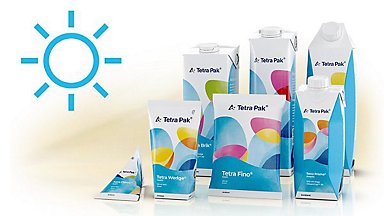Cut carbon, not convenience
Reducing your reliance on fossil fuels helps satisfy your consumers’ demands for greater sustainability. Innovations that increase the content of renewable materials in packaging help you achieve this without sacrificing convenience or functionality – and can also boost your brand value. That’s why we continue to invest heavily in expanding our plant-based solutions.
Watch the video to find out more.
Cut carbon, not convenience
Reducing your reliance on fossil fuels helps satisfy your consumers’ demands for greater sustainability. Innovations that increase the content of renewable materials in packaging help you achieve this without sacrificing convenience or functionality – and can also boost your brand value. That’s why we continue to invest heavily in expanding our plant-based solutions.
Watch the video to find out more.
Plant-based packaging: The future starts here
Renewable content is material that comes from renewable sources, such as wood or sugarcane, that grow back and absorb CO2 from the atmosphere as they do – using such renewable raw materials therefore reduces a package’s carbon footprint and reliance on finite, fossil-based materials. To ensure that our materials are sourced responsibly and sustainably, we work to voluntary sustainability standards such as those from the Forest Stewardship Council™ (FSC™)2, certifying that our paperboard comes from forests managed in accordance with the principles of sustainable forest management, and Bonsucro3, certifying the responsible sourcing of renewable polymers, fully traceable to their sugarcane origin.
Lower your carbon footprint
When it comes to sustainability, reducing the carbon impact of packaging manufacturing and the use of raw materials, both in our own and our suppliers’ operations, is crucial. Our plant-based packaging solutions deliver increased renewable content and can reduce your CO2 emissions – for example, a Tetra Brik® Aseptic 1000 Edge LightCap™ 30 using plant-based polymers in the cap and packaging material coatings has a 37% lower carbon footprint compared to a standard package.1
Carbon Trust verification of carbon reduction data
Our work with the Carbon Trust means our Carton CO2 Calculator model is verified as capable of generating cradle-to-grave carbon footprints in compliance with international standards. We’re also the only carton beverage packaging producer whose calculation model is verified by third party for calculating the cradle-to-grave climate impact to support on-pack CO2 reduction claims for packaging made with plant-based polymers.
1This means creating cartons that are fully made of responsibly sourced, renewable or recycled materials, fully recyclable and carbon-neutral.
2The FSC licence code for Tetra Pak is FSC™ C01404.






